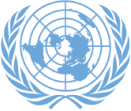Over the Assembly hangs a cloud of uncertainty — indeed, of unease — about the future of multilateralism and of international relations generally. The tragedy of 11 September 2001, which we commemorated just three days ago, has so numbed our minds that we have yet to fully understand its consequences. Therefore, it is meet that, as a family of nations, we should not only remember the disaster, but also seek to learn from it how we can best restore to mankind some measure of faith and hope in our common humanity.
My delegation is pleased to see Mr. Jan Kavan presiding over the Assembly, since, as the representative of a country that has known the horror of war, he will undoubtedly inspire us to find our way forward. In wishing his presidency well, I would also like to place on record our gratitude to His Excellency Mr. Han Seung-soo of the Republic of Korea for guiding us through a most difficult and challenging time. Our appreciation and thanks must also extend to the Secretary-General, who, throughout these past months, has helped to sustain our commitment to the purposes and principles of the United Nations.
We are pleased to welcome Switzerland as a full member of the family of nations, and we look forward to doing the same for East Timor when it takes its place among us.
The international system is now plagued by dangerous instability which threatens to undermine — if not to destroy — many of our States. Not only do we face terrorism, with its horrific violence, but we must also live with other manifestations of terror in the form of poverty, hunger and disease, which, although more silent, are no less deadly.
Conflict, both within and among States, clearly demonstrates how poorly an economy functions without political and social cohesion. Divisions that rend the fabric of our societies — divisions that derive ultimately from ethnicity and race — are not only severely counterproductive to our attempts to better the commonweal, but preclude the emergence of the durable peace and tranquillity without which we will never be able to prosper.
Recent global conferences have focused our attention on the importance of a rights-based approach to social inclusion. However, commitment to inclusive policies rests not only with States but with civil society as a whole. Poverty and underdevelopment are now easily exploited by some elements in our societies to undermine the authority of democratically elected Governments and to exacerbate ethnic and other tensions.
This instability is further compounded by the rampant trade in illegal drugs and arms, with its attendant corruption and violence, which daily tests the legal, financial, security and governance capabilities of most small States. The social contract between the State and its citizens has been seriously jeopardized by these new political developments. Greater national endeavours and international solidarity are now necessary if we are to confront these challenges and ensure the economic and social progress of our peoples.
Old conflicts persist, denying entire populations the opportunity to live in peace and security. The situation in the Middle East must be of special concern to us all, since it threatens to become a wider conflict. The right of the Palestinian people to national self-determination — a right guaranteed by international law — must be upheld if there is to be a just and lasting solution to the region’s problems.
The tensions which exist in India-Pakistan relations with regard to Kashmir should not be allowed to persist, given the risk of calamitous nuclear conflict. As a country which is committed to the pacific settlement of disputes and as a friend of those two important countries of Asia, from which many of our own ancestors originated, Guyana wishes to encourage them to continue their search for a definitive solution.
Global instability results also from our failure to implement the Agenda for Development. After more than a decade of development-related conferences, we have yet to grasp fully the implications for international cooperation of an increasingly interdependent world and a globalized economy. The recent meetings in Doha, Monterrey and Johannesburg brought the international community full circle in assessing the effectiveness of global collective action aimed at the realization of the millennium development goals and the eradication of poverty. We should now be fully persuaded that global action remains indispensable to the development process.
What is less clear, however, is the relationship that should underlie such action, which continues to be a daunting challenge. To what extent can equality be achieved in a system of skewed economic and military power? Will sovereignty ever subject itself to the imperatives of the global good? How can trustworthy procedures be found for international intervention in situations characterized by the threat of collapse of national social and economic structures? What more can be done so that the current international trading system is beneficial for all States, not for only a select few? How can the policies of the Bretton Woods institutions be made more responsive to the concerns and needs of the developing countries in particular?
I know that there are no easy answers to these questions. Indeed, each international conference and every general debate that takes place in this Assembly has made us more aware of how difficult it is to find a consensual approach to these issues. Dialogue and engagement are continuously balanced against hasty attempts to achieve short-term goals. Yet the imperative of global stability — both political and economic — requires a greater symbiotic relationship among States. The increased permeability of borders, which has made all countries vulnerable to contagion from outside, is a reality which we cannot ignore.
Meanwhile, the debate on the benefits of globalization is becoming increasingly polarized. Despite their own best efforts at reform and restructuring, many developing countries have not really seen any significant improvement in their economic and social condition. The growth rate of most developing countries was 2 per cent lower in the 1990s than it was in the oil crisis years of the 1970s. Similarly, although the number of people living in extreme poverty, on less than one dollar a day, has reportedly decreased the past 15 years, those living on less than two dollars a day — an insignificant sum — has increased. Thus, poverty figures have in effect remained high, despite an improvement in world income over the past decade by an average of 2.5 per cent annually.
The situation has been especially difficult for small States. Over the past 10 years, the States members of the Caribbean Community (CARICOM), of which we are one, have been pursuing aggressive socio-economic reform measures designed to enhance the region’s economic competitiveness so as to benefit from globalization. The results have generally been disappointing, in large part due to the small size, and the geographic location of the CARICOM countries, as well as their limited natural resource base and high dependence on international trade, all of which make their economies vulnerable to changes in the global economy. The situation is further aggravated by the high incidence of HIV/AIDS — the second highest in the world.
Small States such as ours in the Caribbean require development cooperation that is based on mutual trust and the fulfilment of commitments. One major step in this direction should be to focus on new ways of balancing equity, economics and ecology in order to create opportunities for small economies without inflicting disillusionment and despair. Every effort should also be made to ensure the full implementation of the Heavily Indebted Poor Countries Debt Initiative so as to liquidate the debt burden in the poorest countries. To address the challenge of development, an integrated strategy must be found to address all the different elements of the problem.
Now — especially since Monterrey — it is fashionable to speak of partnership for sustainable development. Indeed, partnership, if properly conceived and implemented, can serve to eradicate poverty and promote economic growth. However, as the President of Guyana stated at the World Summit on Sustainable Development, in Johannesburg, if it is to succeed, partnership between States must be based not on double standards but on mutual trust and respect and on the interests of all parties. Public/private-sector partnerships must be founded on equity and transparency, with full regard to the laws of our countries. Finally, partnerships with multilateral financial institutions must be informed more by an understanding of the situation in our countries and less by a doctrinaire approach to policy-making. To quote the President directly, "Progress will only come if there is an enlightened understanding of partnership."
Concerned by the inadequacy of past development models and the trend towards leaving development matters largely to market forces, Guyana has sought to promote at the United Nations the concept of a new global human order based on a genuine partnership for cooperation. By addressing the problems of peace and development in a holistic manner, this "concordat" would provide developing countries with the structural, strategic and long-term support that they need. Guyana hopes to build upon resolution 55/48 in the coming months with the aim of bringing greater predictability and stability to international development cooperation.
It is clear that the period ahead of us is fraught with difficulty, and that some of the challenges are historically unprecedented in scale. The instability and uncertainty by which so many societies around the world are afflicted must be attended to if we are to avoid failure. We must therefore ready the United Nations, the most important and most widely supported international governmental organization in existence, to address these problems. There is simply nowhere else to take them.


